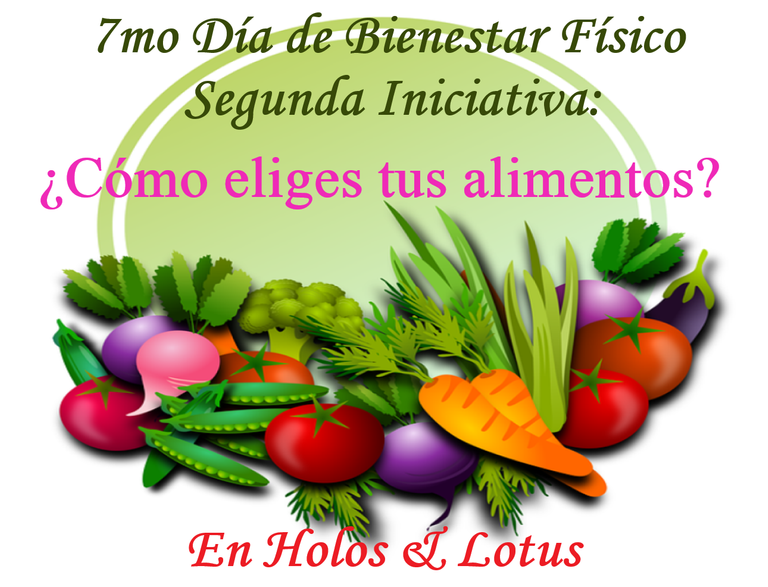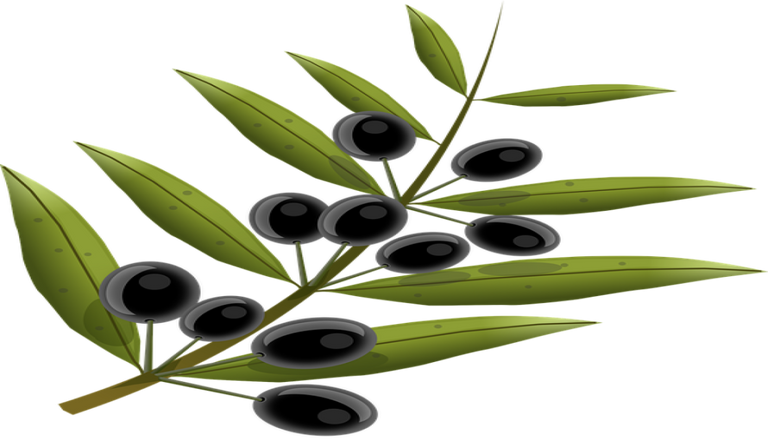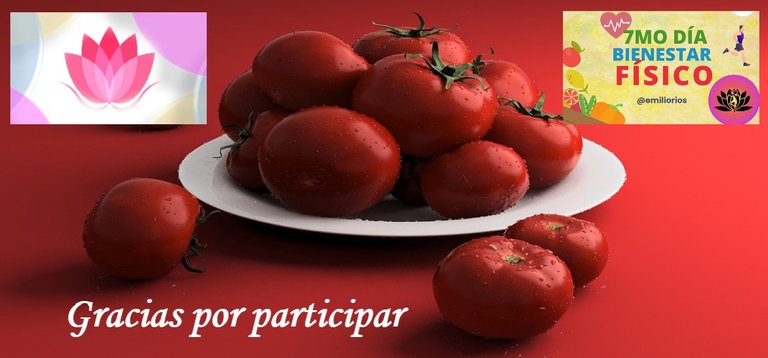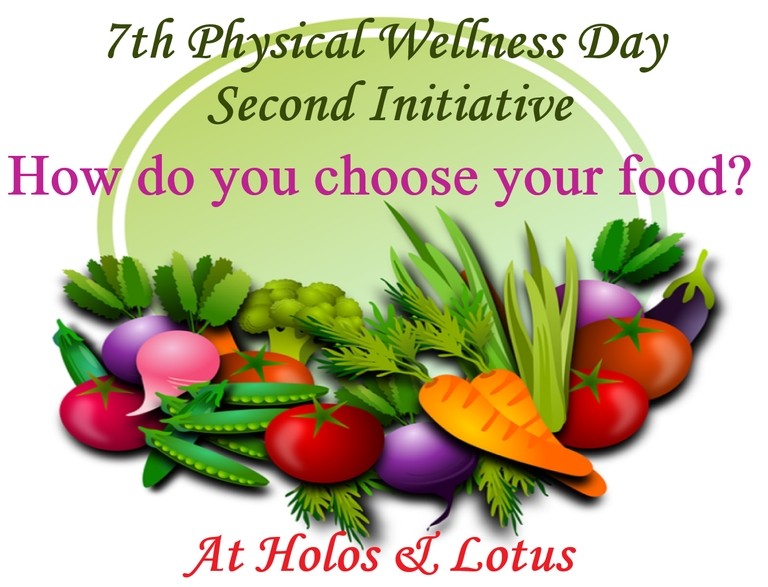
Pixabay-aalmeidah editada en Paint

En esta segunda Iniciativa de nuestra Columna de Bienestar Físico, Séptimo Día; vamos a hablar sobre nutrición o alimentación en casa; lo que comemos y por qué lo comemos. Los principios de alimentación saludable y aprender a elegir ingredientes.
Vamos a pedirles que nos reglen un “reto” personal, apreciaciones y experiencias; regalos de sabiduría en la elección de sus alimentos para la familia o para ustedes mismos.
Y siguiendo las indicaciones de esta publicación, hablaremos de los razonamientos que hacemos para elegir en forma adecuada y saludable los alimentos para preparar nuestras comidas.
Pero también, esperar una invitación que complementa esta segunda iniciativa y que saldrá desde la Cuenta de Holo&Lotus Reto de esta semana.
Disfrutaremos de dos posts realizados desde la confesión honesta de ustedes, y debemos estar pendientes de las publicaciones de la comunidad @holos-lotus para conocer el segundo reto.


Principios de Nutrición Saludable
Y ya sabemos que en bienestar físico, la nutrición es básicamente la opción más importante.
Y es que, los organismos necesitan tomar del medio ambiente los nutrientes para gestionar sus reacciones metabólicas y funcionar.
Así, lo que tomamos del entorno -que ha ido cambiando históricamente en la medida en que el hombre ha ido creciendo en cuanto a civilización y cambiando en cuanto a conductas y a cultura- es la base de lo que refleja nuestra salud.
¡Somos lo que comemos!
Los principios para una vida saludable en cuanto a nutrición, tienen que ver, incluso, con la forma como comemos día a día; la cantidad de veces, la manera como masticamos y hasta las emociones que relacionamos con comer.
Básicamente, tenemos 10 principios, que, por cierto, pueden conseguirlos bien explicados en la publicación de ASMC Seguros (2018) que engloba muchas sugerencias que leemos en la red en cientos y cientos de páginas sobre comer bien y saludable:
La alimentación debe ser a base de alimentos vegetales
Recordemos que el hombre, al principio, tomaba directamente de las plantas sus alimentos; y si nos mantuvimos bien en la prehistoria, también nos debemos mantener fortalecidos, sin problemas, a base de alimentos vegetales; y de hecho, el vegetarianismo y sus variantes así lo afirma.
Debemos limitar el consumo de alimentos de origen animal
Son de difícil digestión y productores de muchos metabolitos tóxicos que necesitan eliminación.
El líquido con el cual el organismo se vivifica y se mantiene hidratado es el agua
Esta debe ser la base de nuestro consumo de bebidas; evitando las bebidas muy procesadas y azucaradas; pues el agua debe ser el líquido más importante que consumamos.
Y sin entrar aquí en disyuntivas, referente a otros tipos de bebidas que utilizamos para socializar y para alegrarnos, como las bebidas alcohólicas; todo moderado puede ser aceptado en forma ocasional; repito, ocasional…
Es importante disminuir, al máximo, el consumo de alimentos procesados
La modernidad ha hecho que compremos alimentos ya preparados con aditivos químicos que se transforman en metabolitos tan tóxicos como los de la alimentación de origen animal:
Por lo tanto, debemos elegir productos frescos y con fibras, que son parte de la alimentación de nuestras bacterias intestinales normales y beneficiosas.
El resto de las sugerencias tienen mucho que ver con la forma de pensar sobre la alimentación
Así también, es lo correcto, que comamos en forma variada; que establezcamos horarios de comidas suficientes y de acuerdo a los ciclos digestivos que tengamos, en cantidades necesarias, para no sobresaturar al organismo y verse este, en la necesidad de almacenar, que es la base de la obesidad.
Igualmente, la actitud: Comer con moderación, masticar despacio, tener un entorno de tranquilidad y con una posibilidad de aceptar el cambio en la manera de consumir los alimentos; y por consiguiente, el tener una mentalidad de auto respeto y de autovaloración; es decir, autoestima correcta para decidir lo que es mejor y no los gustos que nos inculcan en las publicidades.
Debemos aprender a hacer ejercicio y adaptarlo a las cantidades y tipos de alimentos que ingerimos, como una manera de ayudar al organismo a quemar las calorías digeridas que no necesita; y por último, a disfrutar cada uno de los alimentos para que esto sea motivo de satisfacción.

Elegir los alimentos para tus platos
Si de salud hablamos, la elección, entonces, basada en estas reglas que hablamos, se complementan con ciertas reglas nutricionales.
Por ejemplo, nuestros platos deben tener mayor cantidad de verduras, e igualmente, el consumo de frutas debe ser diario.
El uso de los carbohidratos, como pan, cereales, pastas; deben ser integrales y en porciones, preferiblemente en el desayuno y en el almuerzo; pues la cena debe hacerse con respeto y moderación, porque es poco el ejercicio que luego hacemos para quemar los excesos.
Las proteínas, que constituyen la base para la construcción de nuestro organismo, específicamente el área músculo esquelética, debe estar presente en las porciones correctas, porque igualmente, de ella puede haber transformación grasa para almacenarse.
Por lo que, las proteínas deben ser preferiblemente vegetales como los granos, o si son animales, preferiblemente el pescado y las aves.
¡Ah! Y las carnes magras.
Podemos realizar dos porciones al día, siempre con las reglas de los 100 a 150 gramos de proteína en nuestro plato, dependiendo de la ejercitación que hagamos.
Por último, los productos lácteos; y quiero hacer las referencias de que los lácteos deben ir dirigidos, específica y mayormente, para la alimentación de las bacterias que habitan en nuestro intestino y que nos ayudan a mantener defensas y digestión en forma correcta.
Estas bacterias constituyen una de las barreras más importantes contra el ataque de organismos exógenos; por eso, los productos lácteos deben estar basados en yogur y productos desnatados o que son los más naturales y bajos en grasa posible.
Con respecto a los azúcares o carbohidratos, si has visto, hemos hablado poco sobre los procesados; incluso hay corrientes de pensamiento nutricional que dicen que el azúcar no es más que una sustancia creadora de hábitos y de adicción.
¿Es para pensarlo, verdad?
¿En qué momento comenzamos a utilizar azúcares diferentes a la miel o al de las frutas naturales, en nuestras vidas, que se ha convertido en una necesidad?
El que mucha azúcar consume más la desea y la necesita.
Y ya sabemos lo que produce en cuanto a las alteraciones hormonales, como ocurre con la enfermedad de la diabetes.
Básicamente, los tres tipos de alimentos:
Proteínas, que es importante en las primeras fases de la vida y luego para mantener la musculatura; las grasas, que se necesitan para el buen funcionamiento del sistema nervioso central y que deben ser preferiblemente basados en los tipos de grasa Omegas; y los carbohidratos, que son el combustible, y de los cuales el más dañino es el azúcar procesada; pero que podemos encontrar en todos los tipos de alimentos vegetales; son parte necesaria y vital en todos los tipos de comidas que hagamos.
No olvidemos que la sal, que da la sazón correcta a los platos, forma parte de los diferentes minerales que consumimos, por lo tanto, debe ser parte de nuestros alimentos en la justa medida.

Dinámica propuesta:
Me gustaría, que pudiéramos compartir nuestras experiencias referentes a cómo elegimos nuestros alimentos basándonos en lo anteriormente expuesto:
¿Cómo eliges tus alimentos para realizar tus platos; esos platos que les ofreces a tu familia?
Y dos preguntas personales:
Cuando vas a elegir los alimentos para cocinar: ¿Lees las etiquetas, te fijas en el peso y en las cantidades que vas a cocinar según cada comensal; eliges los que menos componentes dañinos tienen?
¿Te sientes satisfech@ con la forma como en estos momentos estás eligiendo tus platos?
Si puedes darnos tu experiencia referente a cómo cocinar, porque puede ser la base para que muchos aprendamos técnicas de elección de alimentos y a tomar conciencia de cuál alimento es mejor que otro según lo que has aprendido y vivido.

Les adelantamos:
Vienen las condiciones de los dos retos relacionado a este tema, por lo que, debes estar pendiente de la publicación de la comunidad @holos-lotus:
“Balanced diet challenge || Reto alimentación balanceada”
Cómo ves, no es una dinámica difícil; es solo compartir conocimientos básicos para que todos aprendamos a comer saludable y a cuidarnos a nosotros y a nuestra familia.
Que pongamos un granito de arena a crear conciencia referente a la elección de alimentos saludables y por qué.

Muchas Gracias, te esperamos y:
¡Bienvenid@ a 7mo Día: Bienestar Físico de Holos & Lotus!

Pixabay-Hansuan_Fabregas editada en Paint con los logos propios de la comunidad

Seventh Day - Physical Wellness. Second Initiative: How do you choose your food?


Pixabay-aalmeidah edited in Paint

In this second Initiative of our Physical Wellness Column, Seventh Day; we are going to talk about nutrition or eating at home; what we eat and why we eat it. The principles of healthy eating and learning how to choose ingredients.
We are going to ask you to give us a personal "challenge", insights and experiences; gifts of wisdom in your food choices for the family or for yourselves.
And following the indications of this publication, we will talk about the reasoning we do to choose in a proper and healthy way the food to prepare our meals.
But also, expect an invitation that complements this second initiative and will be coming out from this week's Holo&Lotus Challenge Account.
We will enjoy two posts made from the honest confession of you, and we must be aware of the publications of the @holos-lotus community to know the second challenge.


Principles of Healthy Nutrition
The choice of the components of our dishes is the basis for a healthy diet.
And we already know that in physical well-being, nutrition is basically the most important option.
Organisms need to take nutrients from the environment to manage their metabolic reactions and function.
Thus, what we take from the environment - which has been changing historically as man has grown in terms of civilization and changed in terms of behaviors and culture - is the basis of what reflects our health
We are what we eat!
The principles for a healthy life in terms of nutrition have to do with the way we eat every day; the amount of times we eat, the way we chew and even the emotions we relate to eating.
Basically we have 10 principles, which by the way, you can get them well explained in the publication of ASMC Seguros (2018) that encompass many suggestions that we read on the net in hundreds and hundreds of pages about eating well and healthy:
The diet should be based on plant foods
Let us remember that man, in the beginning, took his food directly from plants; and if we kept ourselves well in prehistoric times, we should also keep ourselves strengthened without problems, based on plant foods; and in fact, vegetarianism and its variants affirm this.
We must limit the consumption of foods of animal origin
They are difficult to digest and produce many toxic metabolites that need to be eliminated.
The liquid with which the organism is vivified and kept hydrated is water
This should be the basis of our consumption of beverages; avoiding highly processed and sugary drinks; because water should be the most important liquid we consume.
And without going into disjunctions here, regarding other types of beverages that we use to socialize and to cheer ourselves up, such as alcoholic beverages; everything in moderation can be accepted on an occasional basis; I repeat, occasional...
It is important to reduce the consumption of processed foods as much as possible
Modernity has made us buy food already prepared with chemical additives that are transformed into metabolites as toxic as those of food of animal origin.
Therefore, we should choose fresh products and with fibers, which are part of the nourishment of our normal and beneficial intestinal bacteria.
The rest of the suggestions have a lot to do with the way we think about food
It is also important that we eat in a varied way; that we establish sufficient meal times and according to the digestive cycles we have, in correct quantities, so as not to over saturate the body and find itself in the need to store, which is the basis of obesity.
Likewise, the attitude: Eating in moderation, chewing slowly, having a calm environment and with a possibility of accepting the change in the way of consuming food; and having a mentality of self-respect and self-esteem; that is, correct self-esteem to decide what is best and not the tastes that are instilled in us in advertisements.
We must learn to exercise as a way to help the body to burn the digested calories that it does not need; and learn to enjoy each of the foods so that this is a source of satisfaction.

Choosing foods for your dishes
If we talk about health, the choice then, based on these rules that we talked about, are complemented with certain nutritional rules.
For example, our dishes should have more vegetables, and likewise, the consumption of fruits should be daily.
The use of carbohydrates, such as bread, cereals, pasta, should be wholemeal and in portions, preferably at breakfast and lunch, as dinner should be done with respect and moderation, because there is little exercise that we then do to burn off the excesses.
Proteins, which constitute the basis for the construction of our organism, specifically the skeletal muscle area, must be present in the correct portions, because even from it there can be fat transformation to be stored.
So, proteins should preferably be vegetable such as grains, or if they are animal, preferably fish and poultry.
Ah! and lean meats.
We can make two servings a day, always with the rules of 100 to 150 grams of protein on our plate, depending on the exercise we do.
Finally, dairy products; and I want to make the references that dairy products should be specifically or mostly directed to feed the bacteria that live in our intestine and help us to maintain defenses and digestion in a correct way.
These bacteria constitute one of the most important barriers against the attack of exogenous organisms; therefore, dairy products should be based on yogurt and skimmed products or products that are as natural and low in fat as possible.
Regarding sugars or carbohydrates, if you have seen, we have talked little about the processed ones; there are even currents of nutritional thought that say that sugar is nothing more than a habit-forming and addictive substance.
It's food for thought, isn't it?
At what point did we start using sugars other than honey or natural fruit sugars in our lives that it has become a necessity?
The one who consumes a lot of sugar wants and needs it the most.
And we already know what it produces in terms of hormonal alterations, as occurs with the disease of diabetes.
Basically, the three types of food:
Proteins, which is important in the early stages of life and then to maintain musculature; fats, which are needed for the proper functioning of the central nervous system and should preferably be based on the Omegas types of fat; and carbohydrates, which are the fuel, and of which the most harmful is processed sugar; but which we can find in all types of plant foods; are necessary and vital part in all types of meals we make.
Let's not forget that salt, which gives the right seasoning to the dishes, is part of the different minerals we consume, therefore it must be part of our food in the right measure.

Proposed dynamic:
I would like us to share our experiences regarding how we choose our food based on the above:
How do you choose your food to make your dishes; those dishes that you offer to your family?
And two personal questions:
When you are going to choose the food to cook: Do you read the labels, do you look at the weight and the quantities that you are going to cook according to each diner; do you choose those that have the least harmful components?
Do you feel satisfied with the way you are choosing your dishes at the moment? Do you feel satisfied with the way you are choosing your dishes at the moment?
If you can give us your experience regarding how to cook, because it can be the basis for many of us to learn techniques of food choice and to become aware of which food is better than another according to what you have learned and experienced.

We anticipate you:
The conditions of the two challenges related to this topic are coming, so you should be aware of the publication of the community @holos-lotus:
"Balanced diet challenge || Reto alimentación balanceada"
As you can see, it is not a difficult dynamic; it is just sharing basic knowledge so that we all learn to eat healthy and take care of ourselves and our family.
Let's do our part to raise awareness about healthy food choices and why.

Thank you very much, we are waiting for you and:
Welcome to 7th Day: Holos & Lotus Physical Wellness!

Pixabay-Hansuan_Fabregas edited in Paint with the community's own logos

Emilio Ríos – Venezuela
Columnista de Holos & Lotus
Holos & Lotus Columnist

- Logo de English editado en Paint y Barras separadoras, de: / English logo edited in Paint and Separator bars, by
Pixabay-Hansuan_Fabregas






